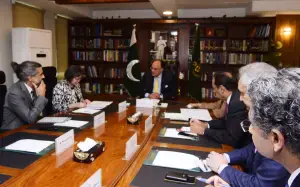Pakistan hikes tax on luxury goods and services to get IMF deal
3 min readPakistan gave a green signal to raise taxes on a raft of luxury imports and services in a bid to unlock the next tranche of an International Monetary Fund (IMF) loan as the National Assembly passed the Finance (Supplementary) Bill, 2023 – mini-budget – on Monday.
“New taxes worth Rs170 billion were imposed in order to meet the power sector deficit and a mini-budget was presented,” Finance Minister Ishaq Dar said in his speech on the floor of the house while presenting the bill. “Everyone should see who made the mistakes.”
The government has assured the IMF of imposing the above mentioned amount of taxes, however, the global lender has stressed that Pakistan must tax the rich and provide subsidies to the poor. The country is desperate to unlock the next tranche of a $6.5 billion loan facility.
The bill was tabled in the lower house of Parliament on February 15. Under this, two measures – raising the federal excise duty on cigarettes and increasing the general sales tax rate from 17 per cent to 18% – were immediately implemented through statutory regulatory orders. The Federal Board of Revenue is expected to generate Rs115 billion from these two measures.
“The prime minister will also unveil (further) austerity measures in the next few days,” Dar said, adding the government would have to take “difficult decisions”.
On a lawmaker’s concern that the finance czar left the house after presenting the bill, Dar said that he went to the Senate under the parliamentary traditions. He thanked the members of the National Assembly from the treasury for recommendations on the bill.
“We had talks with the International Monetary Fund for 10 days. We are facing a loss of Rs1,400 billion because of line losses and electricity theft in the power sector. The cost of electricity production is Rs3,000 billion,” Dar said.
He claimed that the Federal Board of Revenue would meet its targets.
The finance czar accused the previous government of PTI breaking the financial system and the agreement signed with the IMF.
Some amendments have been made to the bill which are:
- Excise duty increased for air passengers travelling in business class
- An excise duty of Rs250,000 has been fixed on tickets for business class passengers going to Canada, North America, and South America. The ticket is priced at around Rs18 to Rs2 million.
- Duty on business class and first class tickets for Africa and the Middle East has been fixed at Rs75,000. The ticked is priced at around Rs500,000
- Excise duty fixed at Rs150,000 on air tickets for European countries. The ticket is priced at Rs800,000 to Rs1,000,000.
- Duty on business and first class air tickets will be fixed at Rs150,000 for passengers going to East Central Asia and Asia Pacific countries.
- The government has decided to increase the stipend amount of Benazir Income Support Programme beneficiaries by 25%
- 10% advance withholding tax on sale of shares outside stock exchange
- Every cigarette brand will pay duty as per its category decided before the tabling of the Finance Bill
- GST to be increased from 17% to 18%; GST on luxury items to increase to 25%
“Cigarettes are not good for health so they are taxed,” Dar said, adding that tax has been imposed on air-conditioned marriage halls. The NA session was adjourned till February 22.
“These are the items which are widely used by the rich class,” he said, adding it would “put the minimum burden on the common man”.
For the latest news, follow us on Twitter @Aaj_Urdu. We are also on Facebook, Instagram and YouTube.


























Comments are closed on this story.